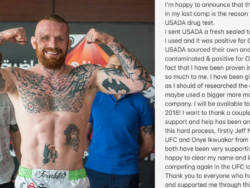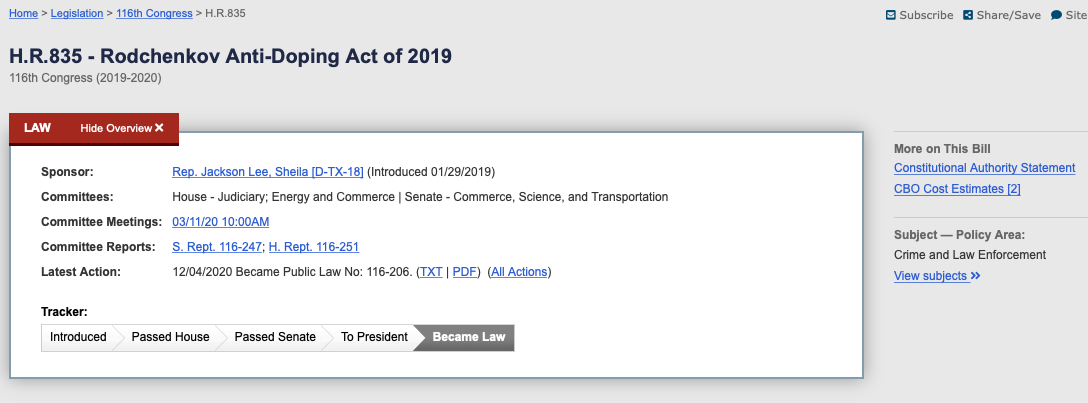The trouble with Ostarine: Jimmy Wallhead’s
16th March 2018
Features


Nine athletes from six countries, competing in four sports, were involved in anti-doping proceedings that came to light this week. Media attention focused on Jamaican triple and long jumper Sabina Allen, UK doubles tennis player Tara Moore, and three Russian rowers sanctioned on the basis of information retrieved from the Moscow Laboratory Information Management System (LIMS), which suggested involvement in Russia’s State doping programme.
Allen was perhaps fortunate to receive a four year ban, which US Anti-Doping Agency (USADA) had sought to increase by two years for ‘aggravating circumstances’. USADA announced that ‘information shared by law enforcement from the first RADA [Rodchenkov Anti-Doping Act] case involving Eric Lira [click here for information on this] allowed USADA to expose the truth in this case’. USADA received information from law enforcement that Allen was in communication with a ‘Mr. B’, whom it alleged is involved in a separate anti-doping cover up.
The American Arbitration Association (AAA) didn’t accept Allen’s explanation that a friend had put an Axcion pill in her smoothie, leading to her Phentermine adverse analytical finding (AAF – or ‘positive test’). It also didn’t accept her explanation that her Jetfuel supplement contained LGD-4033, finding that the samples she submitted for analysis showed signs of manipulation (separate analysis found no trace of LGD-4033 in Jetfuel).
However, despite concluding that Allen used a ‘possibly fictitious’ witness and finding that her Jetfuel samples had been manipulated to indicate high levels of LGD-4033, the AAA ruled that USADA had failed to establish aggravating circumstances, and didn’t extend Allen’s ban. ‘While the uncertainty involving the individual or individuals participating in this investigation prevented the Respondent from meeting her burden of proof, and while the Arbitrator was highly suspicious of the numerous witnesses that had the same address and phone numbers, ultimately the Arbitrator lacks adequate evidence that Mr. B was impersonating other individuals in this case, and as such declines to find aggravating circumstances’, reads the Decision.
UK doubles player Tara Moore has been provisionally suspended after returning an AAF for Nandrolone and Boldenone at a April Women’s Tennis Association (WTA) event in Colombia, throwing her participation at Wimbledon (27 June to 10 July) into doubt. ‘I have never knowingly taken a banned substance in my career’, wrote Moore on Twitter (below). ‘I am investigating how the positive result could have occurred and look forward to proving that I am a clean athlete’.
— Tara Moore (@TaraMoore92) June 8, 2022
Relations between Russia and international sport are likely to be further soured by a ruling involving three Russian rowers, which the World Anti-Doping Agency (WADA) has argued means sport should prosecute historic Russian State doping cases. “It creates a precedent”, Olivier Niggli, WADA’s Director General, told the Associated Press. “If they have the similar kind of evidence available they should prosecute the cases”.
The Court of Arbitration for Sport (CAS) ruled that WADA’s evidence was sufficient enough for the three rowers to be sanctioned for doping offences dating back to 2014. The International Canoe Federation (ICF) had initially ruled that the evidence was insufficient to bring charges against the trio.
The reasoning behind the CAS Decision has yet to be published, however it will be keenly awaited by both sport and Russia, which is preparing legislation exempting Russia from the effects of Decisions reached by CAS. This week, high jumper Mariya Lasitskene (Мария Ласицкене) wrote to the International Olympic Committee (IOC) in protest against the continued exclusion of Russian athletes from international competition (see below).
View this post on Instagram
Russian politicians are now arguing that Decisions taken by international sporting organisations are designed to deliberately undermine Russia’s national team. This week, the International Skating Union (ISU) decided not to tighten rules on changing sports citizenship, under which Russian skaters can adopt a new country.
“The goal is to disband the Russian team as much as possible”, said Roman Teryushkov (Роман Терюшков), a member of the State Duma on Sport and Physical Education. “Our task is to clearly define our position on such actions. Unscrupulousness and sports cannibalism must be stopped.”
Perhaps ironically, Russia may find some help from western national anti-doping organisations (NADOs). This week, a group of NADOs adopted a Declaration of Guiding Principles for the Future of Anti-Doping. ‘Everyone in sport is entitled to aright to justice based, as a minimum standard, on the principles in the Universal Declaration of Human Rights [UDHR] and the European Convention on Human Rights’, reads Principle 2.
Article 2 of the UDHR reads: ‘Everyone is entitled to all the rights and freedoms set forth in this Declaration, without distinction of any kind, such as race, colour, sex, language, religion, political or other opinion, national or social origin, property, birth or other status. Furthermore, no distinction shall be made on the basis of the political, jurisdictional or international status of the country or territory to which a person belongs, whether it be independent, trust, non-self-governing or under any other limitation of sovereignty.’
Finally, it appears that the CAS has accepted that use of a hotel Shisha lounge at a 2019 competition in Morocco caused three jumping riders to return AAFs for cannabis. The FEI initially refused to accept the athletes’ explanations, and imposed two year bans expiring in 2023. The CAS reduced these down to one year bans dating from their provisional suspension, meaning that all three athletes are now free to return to competition. The CAS’s reasoning has yet to be published.
Please continue to send any cases we may have missed or suggestions through to our editor by clicking here. Also, if you’re an athlete, national anti-doping organisation (NADO) or other Results Management Authority and you’d like us to cover a case that you’re involved with, please get in touch! Also – a reminder. The SII Anti-Doping Monitor only features confirmed AAFs (‘positive tests’) or confirmed anti-doping rule violations (ADRVs).
Sheikh Ali Al Thani (CAS Decision & original Decision);
Bassem Mohammed (CAS Decision & original Decision);
Mohamad Talaat (CAS Decision & original Decision);
Tara Moore (ITIA statement & athlete statement);
Sabina Allen (USADA statement & AAA Decision)
Aleksandr Dyachenko, Nikolay Lipkin, Aleksandra Dupik (CAS statement; ICF’s original statement, ICF statement on Lipkin’s other ADRV)
• Eleven athletes (and a horse trainer) from eleven countries, competing in nine sports, were...
• 20 athletes from nine countries, competing in ten sports, were involved in anti-doping proceedings...
• Twenty four athletes from 13 countries, competing in eight sports, were involved in anti-doping...